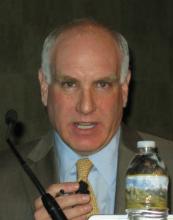TUCSON – Recent neuroscience findings on the nature of memory provide insight into the mechanisms by which psychotherapy results in therapeutic change – and suggest a basis for selecting the best type of psychotherapy for a given patient.
The key brain science finding with profound implications for psychotherapy is that memories are not permanent and stable, as traditionally thought. Rather, they change every time they are recalled and then stored once again, Dr. Richard D. Lane explained at the annual psychopharmacology review sponsored by the University of Arizona.
The core concept of his thesis is that all successful psychotherapy works in the same way: Automatic dysfunctional emotional processes arising from traumatic childhood experiences can be altered by activating the problematic memories, generating new adaptive emotional responses, and then storing the changed memories in stable fashion, said Dr. Lane, professor of psychiatry, psychology, and neuroscience at the University of Arizona, Tucson.
"Therapeutic change in a variety of modalities results from the reconsolidation of emotional memories by incorporating new emotional experiences in contexts reminiscent of the original problematic situations," according to the psychiatrist. "Change in psychotherapy has three necessary ingredients: activation of memories, including the old feelings; activation of new emotional experiences, the more intense the better; and practicing new ways of experiencing the world in a variety of contexts."
His research collaborator, Lee Ryan, Ph.D., highlighted three major changes in thinking about the neuroscience underpinning memory that provide new insight into how psychotherapy works. A central concept concerns what neuroscientists call multiple trace theory, which has shown that the hippocampus and amygdala interact to bind memory and emotions during consolidation of new memories.
"Memories are malleable and constantly undergoing revision because of the process of retrieval or recollection. When you engage in recollection, the memory goes into an unstable state, so at that moment there’s the possibility of adding information. We’re not just laying down a new memory but actually changing in fundamental ways the original memory," said Dr. Ryan, director of the cognition and neuroimaging laboratories at the university.
Two other relevant relatively recent neuroscience insights derived from animal work and human studies supported by functional MRI are that stress enhances the retrieval of both memories and emotions, and that episodic memory and semantic structures are interactive systems.
"The classic way we’ve thought about memory is wrong. The hippocampus is equally active in both semantic memory tasks and emotional memory," she said. "Episodes can be used as a vehicle to change semantic structures and vice versa."
Dr. Lane stressed that these insights from neuroscience have clinical implications for the practice of psychotherapy. For example, the traditional psychodynamic psychotherapy strategy of having the patient lie on a couch with the analyst out of view is probably less conducive to creating new emotionally arousing adaptive experiences than sitting up face to face. Also, it’s likely that when an analyst is relatively quiet and nonengaging, the patient is more likely to merely relive old traumatic experiences in the treatment sessions without having enough new therapist-assisted experiences to change the old memories. This is a formula for unsuccessful long-term analyses.
The new neuroscience also suggests a possible shift in emphasis for cognitive-behavioral therapy. CBT might get better results by placing greater emphasis upon changing emotional experience than in changing thoughts in order to promote reconsolidation of memories. There are data to suggest the clinical benefits of emotion-focused therapy are longer lasting than with CBT. It might well be that the greater emotional intensity of emotion-focused therapy leads more readily to adaptive memory change, Dr. Lane said.
The novel neuroscience research on memory provides guidance on selecting the best type of psychotherapy for various problems. Emotion-focused therapy or CBT might be the optimal choice for patients with symptomatic syndromes, such as clinical depression, that are temporary disturbances in emotional responses that are not situation specific. Behavioral therapy might be the way to go for phobias in which a specific situation can be identified as the trigger for the maladaptive response. And psychodynamic, insight-oriented psychotherapy might be best for patients troubled by enduring trait characteristics that are neither temporary nor situation specific, he said.
Dr. Lane closed with a provocative prediction: Prescribing naps after a therapy session might facilitate change in psychotherapy.
Neuroscience has shown that sleep – especially REM sleep – enhances the consolidation of both emotional and procedural aspects of memory. Clinical trials have demonstrated that the best results in treating depression are obtained with the combination of psychotherapy and antidepressant medications. It’s possible that some of this enhanced benefit is the result of the antidepressant-induced improvement in sleep, which fosters enhanced consolidation of the new memories achieved in psychotherapy. If so, perhaps a nap with REM sleep after a psychotherapy session could accomplish much the same.



